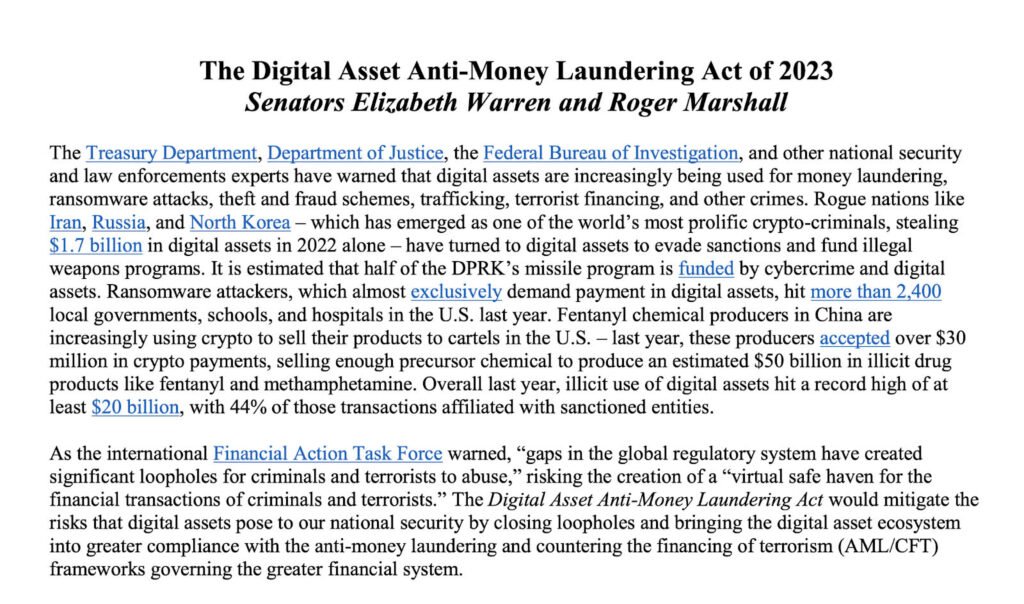In a bid to address the government’s growing concerns surrounding the illicit use of digital assets, Senators Elizabeth Warren and Roger Marshall have introduced the Digital Asset Anti-Money Laundering Act of 2023.
The Digital Asset Anti-Money Laundering Act of 2023
The proposed legislation aims to bolster national security by closing loopholes and ensuring that the digital asset ecosystem aligns with existing anti-money laundering and combating the financing of terrorism (AML/CFT) frameworks governing traditional financial systems.

According to the filing, the motivation behind the proposed legislation stems from alarming reports by multiple national security agencies, highlighting the increasing use of digital assets in money laundering, ransomware attacks, fraud schemes, and even funding for “rogue nations” like Iran, Russia, and North Korea. It states:
“Iran, Russia, and North Korea—which has emerged as one of the world’s most prolific crypto-criminals, stealing $1.7 billion in digital assets in 2022 alone—have turned to digital assets to evade sanctions and fund illegal weapons programs.”
Strict KYC on Bitcoin Wallets
The proposed measures in the Digital Asset Anti-Money Laundering Act include a comprehensive extension of the Bank Secrecy Act (BSA) responsibilities. It claims to work on the “same transaction, same risk, same rule” philosophy, imposing strict Know-Your-Customer (KYC) requirements on all echelons of the digital asset sector, from miners to wallet providers.
In particular, the legislation focuses on “unhosted” digital wallets, which allow users to bypass AML and sanctions checks. The Act directs the Financial Crimes Enforcement Network (FinCEN) to finalize and implement its December 2020 proposed rule. This rule requires banks and money service businesses to verify customer and counterparty identities for transactions involving unhosted wallets or wallets hosted in non-BSA-compliant jurisdictions.
The proposed bill also aims to address the anonymity-enhancing technologies used in the digital asset space. It suggests FinCEN should issue guidance to financial institutions on mitigating the risks associated with anonymized digital assets. The document reads:
“It directs FinCEN to issue guidance to financial institutions on mitigating the risks of handling, using, or transacting with digital assets that have been anonymized using digital asset mixers and other anonymity-enhancing technologies.”
To strengthen the enforcement, the Act directs the Securities and Exchange Commission (SEC) and the Commodity Futures Trading Commission (CFTC) to establish AML/CFT compliance examination and review processes for entities under their regulatory purview.
Recognizing the global nature of digital assets, the Act extends BSA rules to include the reporting of foreign bank accounts. U.S. citizens engaged in transactions exceeding $10,000 in digital assets through offshore accounts would be required to file a Report of Foreign Bank and Financial Accounts (FBAR) with the Internal Revenue Service (IRS).
Related reading: “Bitcoin Is In Danger In U.S.” — Warns Hedge Fund Manager Paul Tudor
The Community Reacts
Senator Warren’s legislative proposal drew a swift and potent response from the Bitcoin community.
Critics argue that imposing anti-money laundering (AML) regulations on developers and node operators might stifle innovation and compromise privacy.
Balancing security and user privacy is a major concern, with detractors, including legal experts and digital-asset think tanks, warning against the potential erosion of privacy rights in the pursuit of regulatory compliance.
Related reading:










